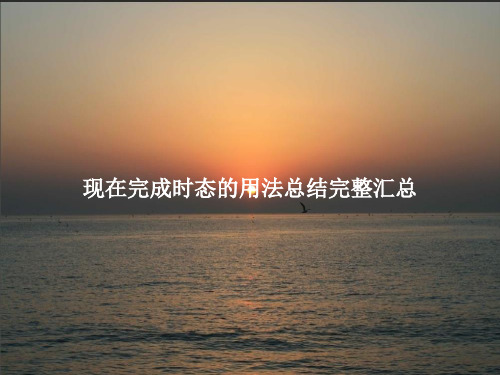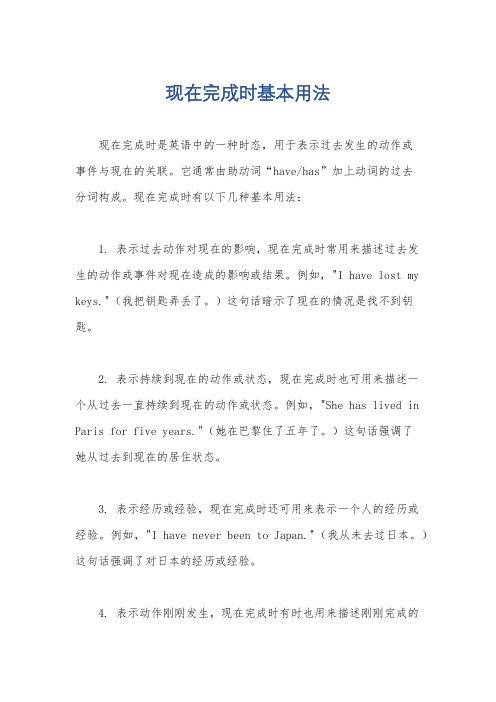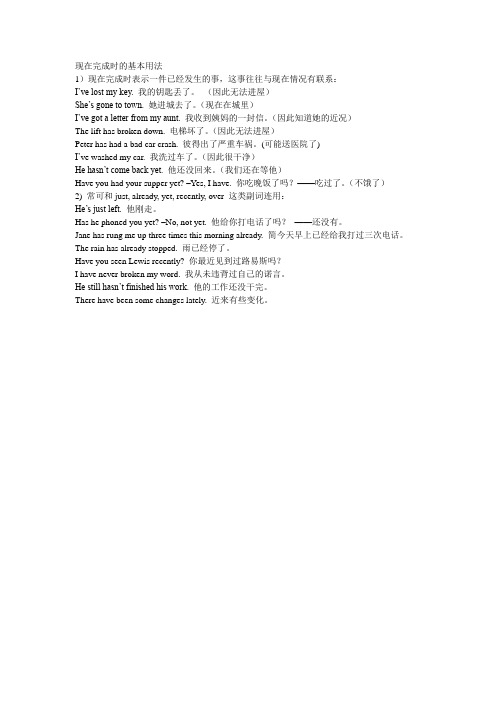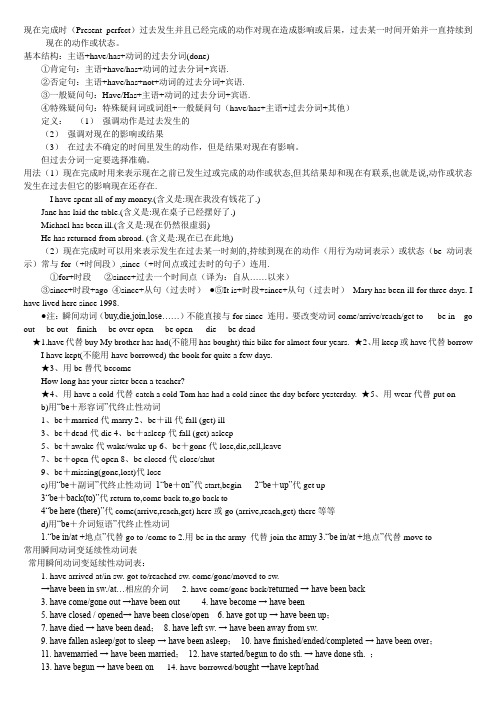现在完成时基本用法
现在完成时的基本用法

现在完成时讲解与练习(一)现在完成时的基本用法(1)强调动作是从过去持续到现在,并有可能继续持续下去。
(2)强调对现在的影响或结果,此用法容易和一般过去时混淆。
两者的区别是:一般过去时有动作发生的时间点,即过去某一时间发生某一动作;现在完成时则没有,即不强调是哪个时间点发生的动作,而强调过去的动作对现在造成的影响和结果。
(3)在过去不确定的时间里发生的动作,但是结果对现在有影响。
一、现在完成时的构成(一)肯定式主语+助动词have /has +过去分词+其它说明:这里的have /has是助动词,没有什么具体意义。
当主语是第三人称单数时助动词用has,其余人称一律用have。
has,have的缩略式分别为's或've。
规则动词过去分词的构成与过去式的构成方式一样,不规则动词可参看不规则动词表。
实例:1)I've just copied all the new words .我刚抄写了所有的生词。
(表示不要再抄了)2)She has lost her books .她丢失了她的书。
(表示到目前为止还没有找到)(如果用过去时:She lost her books . 则强调书是过去丢的这一动作,而不知现在有没有找到)3)We've just cleaned the classroom .我们刚好打扫了教室。
(表明现在教室是干净的)(二)否定式主语+助动词have /has+not+过去分词+其它说明:现在完成时构成否定句时,只需在助动词have /has后面加not就行。
have not,has not的缩略式分别为haven't ,hasn't。
另外,肯定句中有some,already时,改为否定时要分别改成any,yet。
实例:1)I haven't finished my homework yet.我还没有完成我的作业。
2)She hasn't travelled on a train .她没有坐火车旅行过。
现在完成时态的用法总结完整汇总

He has been a singer for eight years. He has been a singer since 1992. He has been a singer since he won the prize for music in 1992.
He has been a teacher for ten years. He has been a teacher since 1990. He has been a teacher since he left college in 1990. 1990-2000
left college
2000.7—2000.9 moved to Japan
⑤ Has he eaten that apple yet 他吃那个苹果了吗
注意:1 现在完成时的一般疑问句往往在句末加yet, 2 一般疑问句译成汉语时, 往往译成…..过吗 ,还有….吗 等. 3 其肯定回答用:Yes,….have has . 否定回答用:No,….haven‘t hasn’t .
6) My mother has been a doctor _f_o_r __ many years.
3.延续性动词与非延续性动词在现在完成时中的使用,
1 延续性动词:be,have,know,live,
work,study,learn,teach,speak,talk,draw,
wait,wear,walk,sleep等,这些动词可以和表示一段时间的状
语连用,例如:
现在完成时的用法详解_英语课件

burnt/burned burnt/burned
bought caught dug felt bought caught dug felt
fight
fought
fought
(二)ABB型:
find
have hear hold keep
found
had heard held kept
found
had heard held kept
b) never 是否定词,表示“从来没有”,而 ever 表示“曾经”
• We have never been to the Great Wall.
我们从来没有去过长城。
• Have you ever been to Canada?
你们曾经去过加拿大吗?
c) just表示“刚刚”(用于完成时态时,与already, never 等副词的位置一样,多用在助动词have/has 和动词过去分词之间)
said
sold sent
(二)ABB型:
shine
shoot sit sleep smell
shone/shined
shot sat slept smelt/smelled
shone/shined
shot sat slept smelt/smelled
spell
spend
spelt/spelled
3.
Have you read this novel ? 你看过这本小说吗?
Yes , I have. 是的,看过了。No, I haven’t. 不,没看过。
4.
We have studied English for two years.
我们已经学了两年英语了。 5. They haven’t seen each other since 1998.
现在完成时的三种基本用法

现在完成时的三种基本用法
现在完成时是英语中最常用的时态之一,它表示过去发生的动作或状态对现在产生的影响。
现在完成时有三种基本用法,分别是表示经验、表示持续状态和表示完成的动作对现在的影响。
一、表示经验
现在完成时可以用来表示一个人的经验或经历。
例如,“我已经去过巴黎了”表示我曾经去过巴黎,这是我的经验。
这种用法通常和时间状语连用,如“已经”、“曾经”、“从来没有”等。
二、表示持续状态
现在完成时还可以用来表示一个动作或状态从过去一直持续到现在。
例如,“我已经学习英语十年了”表示我从十年前开始学习英语,一直到现在还在学习。
这种用法通常和时间段连用,如“十年”、“三个月”等。
三、表示完成的动作对现在的影响
现在完成时还可以用来表示一个动作已经完成,但对现在产生了影响。
例如,“我已经吃过晚饭了”表示我已经吃完了晚饭,但这个动作对现在的状态有影响,我现在不饿了。
这种用法通常和表示现在状态的词连用,如“饿”、“累”、“渴”等。
现在完成时是英语中非常重要的时态,它可以用来表示经验、持续状态和完成的动作对现在的影响。
在学习英语时,我们需要掌握这三种基本用法,以便更好地运用现在完成时。
现在完成时的基本用法

现在完成时讲析现在完成时是发生在过去的动作与现在联系的一种时态,这里的联系主要包含以下三层意思:①动作发生在过去并且已经结束,影响到现在。
②动作开始于过去延续至现在甚至将来。
③从过去到现在之间做过的事情。
第一点是靠影响联系现在,第二点是动作直接联系至现在,第三点是靠时间来联系过去和现在。
对学生来说,第一、三点理解较难,容易和一般过去时混淆,第二点要容易掌握一些。
现在完成时是现在时的一种,其落足点是现在。
下面具体阐述这三点。
一、现在完成时的基本用法㈠、现在完成时表示一件已经发生的事,对现在有影响。
这种影响可以通过上下文引申出来,据具体情况而定。
常可和just, already, yet, recently, over 这类副词连用。
试看下列例子:1、I’ve lost my pen. 我的钢笔丢了,它包含以下两层意思:I lost my pen in the past.I don’t have a pen now.A B O (图例—1)如图—1所示,在A或A---B点之间为丢失这个动作发生的时间,O点为说话的现在,那么丢失这一动作在说话之前已经结束,现在状态是:我没有钢笔。
试看:—May I use your pen,Tom ?—Sorry, I’ve lost my pen.丢笔(过去发生并结束) →现在没有笔→向对方说对不起,无法借笔给对方。
2、I’ve eaten my lunch.我吃了午餐,它包含以下两层意思:I ate my lunch in the past.I am full now.如图—1所示,假如A或A---B点之间点为吃饭这个动作发生的时间,B点为说话的现在,那么吃饭这一动作在说话之前已经结束,影响到现在:就是现在我不饿。
试看:—Let’s go out for a lunch ?—Sorry, I’ve eaten my lunch.吃了饭(过去发生并结束)→现在我不饿→拒绝邀请3、She’s gone to town. 她进城去了。
现在完成时基本用法

现在完成时基本用法
现在完成时是英语中的一种时态,用于表示过去发生的动作或
事件与现在的关联。
它通常由助动词“have/has”加上动词的过去
分词构成。
现在完成时有以下几种基本用法:
1. 表示过去动作对现在的影响,现在完成时常用来描述过去发
生的动作或事件对现在造成的影响或结果。
例如,"I have lost my keys."(我把钥匙弄丢了。
)这句话暗示了现在的情况是找不到钥匙。
2. 表示持续到现在的动作或状态,现在完成时也可用来描述一
个从过去一直持续到现在的动作或状态。
例如,"She has lived in Paris for five years."(她在巴黎住了五年了。
)这句话强调了
她从过去到现在的居住状态。
3. 表示经历或经验,现在完成时还可用来表示一个人的经历或
经验。
例如,"I have never been to Japan."(我从未去过日本。
)这句话强调了对日本的经历或经验。
4. 表示动作刚刚发生,现在完成时有时也用来描述刚刚完成的
动作。
例如,"I have just finished my homework."(我刚做完作业。
)这句话强调了动作的刚刚完成。
总的来说,现在完成时用来表达过去与现在的关联,强调过去的动作或事件对现在的影响、持续状态、经历或刚刚完成的动作。
希望这些解释能够帮助你更好地理解现在完成时的基本用法。
现在完成时的基本用法

现在完成时的基本用法1)现在完成时表示一件已经发生的事,这事往往与现在情况有联系:I’ve lost my key. 我的钥匙丢了。
(因此无法进屋)She’s gone to town. 她进城去了。
(现在在城里)I’ve got a letter from my aunt. 我收到姨妈的一封信。
(因此知道她的近况)The lift has broken down. 电梯坏了。
(因此无法进屋)Peter has had a bad car crash. 彼得出了严重车祸。
(可能送医院了)I’ve washed my car. 我洗过车了。
(因此很干净)He hasn’t come back yet. 他还没回来。
(我们还在等他)Have you had your supper yet? –Yes, I have. 你吃晚饭了吗?——吃过了。
(不饿了)2) 常可和just, already, yet, recently, over 这类副词连用:He’s just left. 他刚走。
Has he phoned you yet? –No, not yet. 他给你打电话了吗?——还没有。
Jane has rung me up three times this morning already. 简今天早上已经给我打过三次电话。
The rain has already stopped. 雨已经停了。
Have you seen Lewis recently? 你最近见到过路易斯吗?I have never broken my word. 我从未违背过自己的诺言。
He still hasn’t finished his work. 他的工作还没干完。
There have been some changes lately. 近来有些变化。
英语现在完成时的用法总结

现在完成时(Present perfect)过去发生并且已经完成的动作对现在造成影响或后果,过去某一时间开始并一直持续到现在的动作或状态。
基本结构:主语+have/has+动词的过去分词(done)①肯定句:主语+have/has+动词的过去分词+宾语.②否定句:主语+have/has+not+动词的过去分词+宾语.③一般疑问句:Have/Has+主语+动词的过去分词+宾语.④特殊疑问句:特殊疑问词或词组+一般疑问句(have/has+主语+过去分词+其他)定义:(1)强调动作是过去发生的(2)强调对现在的影响或结果(3)在过去不确定的时间里发生的动作,但是结果对现在有影响。
但过去分词一定要选择准确。
用法(1)现在完成时用来表示现在之前已发生过或完成的动作或状态,但其结果却和现在有联系,也就是说,动作或状态发生在过去但它的影响现在还存在.I have spent all of my money.(含义是:现在我没有钱花了.)Jane has laid the table.(含义是:现在桌子已经摆好了.)Michael has been ill.(含义是:现在仍然很虚弱)He has returned from abroad. (含义是:现在已在此地)(2)现在完成时可以用来表示发生在过去某一时刻的,持续到现在的动作(用行为动词表示)或状态(be动词表示)常与for(+时间段),since(+时间点或过去时的句子)连用.①for+时段②since+过去一个时间点(译为:自从……以来)③since+时段+ago ④since+从句(过去时)●⑤It is+时段+since+从句(过去时)Mary has been ill for three days. I have lived here since 1998.●注:瞬间动词(buy,die,join,lose……)不能直接与for since 连用。
- 1、下载文档前请自行甄别文档内容的完整性,平台不提供额外的编辑、内容补充、找答案等附加服务。
- 2、"仅部分预览"的文档,不可在线预览部分如存在完整性等问题,可反馈申请退款(可完整预览的文档不适用该条件!)。
- 3、如文档侵犯您的权益,请联系客服反馈,我们会尽快为您处理(人工客服工作时间:9:00-18:30)。
现在完成时 1)现在完成时的构成:have / has + 过去分词 2)现在完成时态的肯定句、否定句和疑问句形式(以be和see为例):主语肯定式否定式疑问式第一、二人称和第三人称复数以及名词复数I /We/You/ They havebeen here before.He/ She has been herebefore..I / We/ You/ They/Many people have seenthe film.I /We/You/ Theyhaven’t been herebefore.He/ She hasn’t been herebefore ..I / We/ You/ They/Many people haven’tseen the film.Have you/ they beenhere before?Has he/ she been herebefore?Have you/ they/ manypeople seen the film? 在完成时的用法: 1、表示过去发生的动作对现在造成的影响或结果.常与already, just, ever, never, before等词连用. 如: She has never read this novel.他从未读过这本小说.(他对小说的内容不了解) 2、表示 "过去的动作"一直延续到现在并有可能继续延续下去. 常与for (后跟段时间)或since (后跟点时间)等连用.如: I have been a member of the Party for 10 years. I have been a member of the Party since 10 years ago. 注:在有for 和since 引导时间状语的句子中不能用短暂性动词,应用与之相应的表示状态的词。
瞬间动词(buy,die,join,lose……)不能直接与for since 连用。
要改变动词He has died for 3 years.(F) He has been dead for 3 years.(T)go out----be outfinish----be overopen----be opendie----be dead ★1.have代替buyMy brother has had(不能用has bought) this bike for almost four years.★2、用keep或have代替borrowI have kept(不能用have borrowed) the book for quite a few days.★3、用be替代becomeHow long has your sister been a teacher?★4、用have a cold代替catch a coldTom has had a cold since the day before yesterday. 注意:①现在完成时不能和表示明确的过去时间连用。
如:in 1998, last morning等 ②have/has been to 表示"去过"(去了又回来了) have/has gone to 表示"去过"(去了没回来了)常用瞬间动词相应持续性动词关系如下:1、go——be away2、come——be here3、come back——be back4、leave——be away(be not here)5、buy——have6、borrow——keep7、die——be dead 8、begin——be on9、finish——be over 10、open——be open11、close——be closed 12、lose——be lost13、get to know——know 14、turn on——be on15、get up——be up 16、sit down——sit/be seated17、join——be in(…)或be a…member18、become——be一、单项选择1. Li Hong has ________ the army for 2 years.A. joinedB. be inC. been inD. joined in2. We have been friends since ______.A. childrenB. five yearsC. five years agoD. five years before3. Mike ___________ the story for a month.A. has boughtB. has hadC. had hadD. has borrowed4. You ______ that question three times.A. already askedB. have already askedC. already have askedD. asked already5. Those foreign friends left Guangzhou __________.A. since last weekB. a week agoC. for a weekD. since a week ago6. I _____ at this school for two years.A. am studyingB. studyC. studiedD. have studied7. They _________ in the city since last summer.A. liveB. didn’t liveC. have livedD. live8. Mrs. Wang has lived in Haikou _________ 1992.A. sinceB. fromC. afterD. in9. Mr. Black _________ China since the summer of 1998.A. has been toB. has been inC. has come toD. came to10. His father _______ for years.A. has diedB. has been deadC. diedD. dies11. Mary ________ to see the films because she __________ it twice.A. won’t go, sawB. won’t go, will seeC. won’t go, has seenD. didn’t go, sees12.---- Would you like some more food?----Thank you. I _______ enough.A. will haveB. have hadC. haveD. had13. ______ you ______ England? Yes, it _____ a beautiful country.A. Will, gone to, wasB.Have, been to, isC. Had, been to, isD.Have, gone to, is14. ----_______ you _______ to Beijing?----No, I ______.I ______ there early next month.A. Have, been, haven’t, am goingB. Had, been, hadn’t, am goingC. Have, gone, haven’t, was goingD. Did,go, didn’t, was going15. ---You sister ______ to London to study English. Is that true?---Yes , she ___ there for two months.A. has been, has beenB. will go, has goneC. gone, will beD. has gone, has been16. He has a computer of his own. He ____ it two days agoA. boughtB. boughtC. boughtD. has bought17. —Where is Li Lei? —He ___ Shanghai.A. has gone toB. has been toC. went toD. goes to18. He _______ his homework and is now listening to music.A.. finishesB. has finishedC. finishD. is finishing19. David _______ Shanghai for more than three months.A. came toB. has been toC. has been inD. has come to20. --- Is your father a Party member?--- Yes, he ____ the party three years ago. He _____ a Party member for three years.A. joined; has beenB. has joined; has beenC. was joined; isD. joined; was21. ---What a nice bike! How lone ____ you ____ it? ----Just five weeks.A. will; buyB. did; buyC. are; havingD. have; had22. I ______ this book for a week .I have to return it now.A. borrowedB. have borrowedC. keptD. have kept23. ----______ your sister _______ in Green China for a long time?----Yes. She joined it five years ago.A. Has; beenB. Have; beenC. Has; joinedD. Have; joined24. ---How long have you _______ from the USA? ----For three months.A. come backB. returnedC. go backD. been back25. I _____ this book for half a year.A. have boughtB. have hadC. boughtD. had26. The students are sorry to hear that famous singer _______ for a year.A. has leftB. has goneC. has been awayD. has gone away27. --- ______ you______ your homework yet? ---Yes, I _____ it just now.A. Did; do; finishedB. Have; done; finishedC. Have; done; have finishedD. Will; do; finish28. The sand storm weather ______ in Beijing several times this year.A. happenB. happenedC. has happenedD. have happened29. ---How long have you been here? --- ____ last month.A. ForB. UntilC. BeforeD. Since30. He ____ a cold for three days.A. has caughtB. has hadC. has gotD. caught31. Jim Green ____ in China for two years.A. has comeB. has beenC. has arrivedD. came32. The film ____ for half an hour.A. has been onB. has begunC. hasn’t begunD. began33.—Where have you _______ these days?—I have to Beijing with my friends.A. been;goneB. been;beenC. gone;beenD. gone;gone 34.How long have you _______ this book?A. bought B.borrowed C.had D.lent35. We have lived here _______ five years ago.A. when B.since C.before D.after36.—I have watched the game. —When _____you _______ it?A.have;watched B.do;watch C.did;watch D.will;watch 37.—How do you like Beijing, Mr. Black?—Oh,I _______ such a beautiful city.A.don't visit B.didn't visit C.haven't visited D.hadn't visited 38.Miss Brown _______ to the Great Wall twice.A.have been B.has been C.have gone D.has gone39.His brother has been to Stone Forest twice ______ he came to Yunnan.A.after B.before C.since D.for40.His grandpa _______ for two years.A.was died B.has been dead C.was dead D.has died 41.—Have you ever_______ to Haikou?—Yes,I_______ there with my family last August.A.gone;went B.been;went C.been;went to D.been;was in 42. His sister ______ her hometown for three years. She'll return next year.A.left B.has left C.has been away D.has been away from以适当形式填空1. I_______ already _______ (see) the film. I _________ (see) it last week.2. ----- _______ he ________(finish) his work today ? ------Not yet .3. -----_____you _______(be) to Hong Kong ?----Yes, I ________________ (be) there twice .4. -----_______ you ever ________(eat ) chocolate sundaes ? ----No, never.5. My father ____ just ________ (come) back from work. He is tired now.6. Where’s Li Ming ? He ____________ (go) to the teacher’s office.7. Shanghai _______ (be) a small town hundreds of years ago. Now it ____ (become) a large city.8. I _____________ (work) here since I __________ (move) here in 1999.9. So far I ______________(make) quite a few friends here.10. ---How long ______ the Smiths ________(stay)here? ---- For two weeks.11. --- I ___________ (see) the film “Chicken Run”.--- Where and when ________ you _______ (see) it?--- Last week.12. Mary _____ already _______ (have) her supper.13. I ____________ (not want) to see the film. I ___________ (see) it with my parents. We _________ (see) it last Sunday.14. ---______ Uncle Wang ______ (mend) the TV yet?---Yes, he______.---When _____ he _____ it?--- Yesterday.15. ______ you _______ (read) today’s newspaper yet?16. They _____already_____(do) their homework. But they don’tknow what_____ (do) next.17. ---____ you _____ (see) the film last night?---No, I ___________ (see) it for several times.18. She ____________ (be) ill for three days.19. My father ___________ ( buy) a book for me yesterday. He____ already _________(pay) fifty yuan for it.20. She____________ (not read) this book before.21. ____ you ever __________ (travel) on a train before?22. --- ____ Wei Hua _____ (come) yet?---Yes. She_______ (come) already. She ______ (come) just now.23. ---How long _____you __________(learn) English?---For more than two years.24. They _______________ (live) in China since they _____ (move) to China.。
